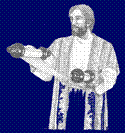|
Zacharias's prophecy
Perhaps Christendom's greatest blunder - and one so serious that it calls into question its very legitimacy - is its refusal to accept God's choice of Abraham's descendants as His "very own people forever" (2 Sam. 7:24). Sure, Christendom's mightiest minds have come up with heaps of clever-sounding arguments to explain why God has broken His promise and abandoned His people, replacing them with a "new, spiritual Israel", but every such argument smashes to smithereens on the rock of Scripture. "Replacement Theology" (aka supersessionism), rather than explaining and upholding biblical truth, amounts to nothing less than a rejection of God's sovereign election of Israel, a theme of both the Old and New Testaments.
Ever wondered why Zacharias's prophecy never gets so much as a perfunctory nod in Christian writings and preaching? Zacharias was a priest and the father of John the Baptist. His prophecy was uttered shortly after John's birth and circumcision. Few people have ever heard of Zacharias's utterance, and fewer still take it seriously. Why? Read it and see:
Blessed is the Lord God of Israel, for He has visited and redeemed His people, and has raised up a horn of salvation for us in the house of His servant David. That we should be saved from our enemies and from the hand of all who hate us, to perform the mercy promised to our fathers and to remember His holy covenant, the oath which He swore to our father Abraham: to grant us that we, being delivered from the hand of our enemies, might serve Him without fear, in holiness and righteousness before Him all the
|
days of our life. And you, child, will be called the prophet of the Highest; for you will go before the face of the Lord to prepare His ways, to give knowledge of salvation to His people by the remission of their sins, through the tender mercy of our God, with which the Dayspring from on high has visited us; to give light to those who sit in darkness and the shadow of death, to guide our feet into the way of peace (Luke 1:68-79).
From beginning to end the priest's words revolve around the significance of the imminent coming of the "Lord", Jesus Christ, for the people of Israel, the only nation God had "known of all the families of the earth" (Amos 3:2). Perhaps Zacharias just got it wrong. Not according to the author of the gospel, who tells us that Zacharias "was filled with the Holy Spirit" when he uttered these words of hope for Israel (vs. 67). Yeh, but these words have never been fulfilled in Israel, so they must surely have been little more than a lofty expression of some hope for deliverance and glory hard-wired into the Jewish soul. I'd be extremely hesitant to suggest that a "prophecy" uttered under the influence of the Holy Spirit should be seen as nothing more than a poetic expression of some nationalistic aspiration.
In short, those who take Scripture seriously simply cannot get around the obvious intent of Zacharias's inspired song of praise towards God for Messiah's role in restoring the kingdom to Israel. When the time is right, it will happen. In the meantime, let us not be found belittling Israel's divine election. The Father of Jesus Christ is one and the same as "the Lord God of Israel".
|




